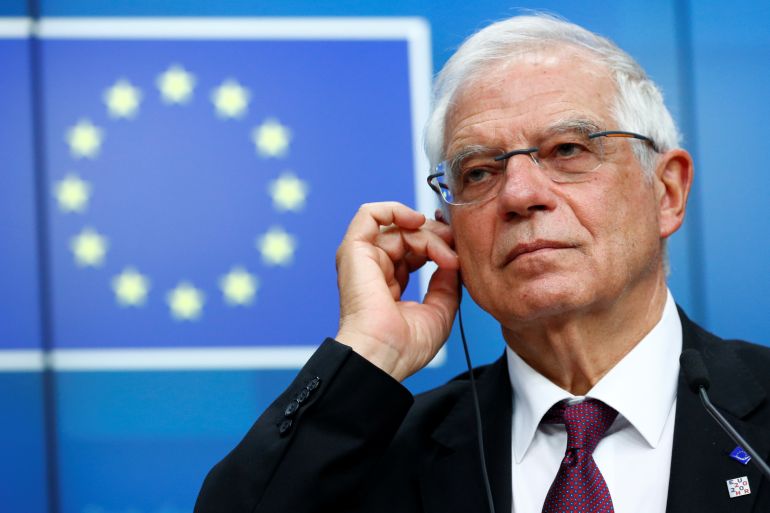Top EU diplomat decries Russia’s ‘massive war crime’ in Mariupol
Borrell says EU foreign ministers will discuss more support to Ukraine and fresh sanctions on Russian oil and gas sectors.

The European Union’s foreign policy chief has called Russia’s attack on the Ukrainian port city Mariupol “a massive war crime”, as a string of member states pushed for sanctions on Moscow’s key energy sector.
“What’s happening now in Mariupol is a massive war crime, destroying everything, bombarding and killing everybody,” Josep Borrell said at the start of a meeting of EU foreign ministers in Brussels on Monday.
Keep reading
list of 4 itemsEuropean space agency suspends Mars mission with Russia
Should Ukraine declare its neutrality as a way to stop the war?
Four European countries expel 20 Russian diplomats
German Foreign Minister Annalena Baerbock echoed the forceful condemnation of Russia’s bombing of civilians in Ukraine.
“The courts will have to decide, but for me, these are clearly and unequivocally war crimes,” she said.
“It makes it all the more clear that we, as the EU, that we as the world community who believe in a rules-based international order, must clearly isolate this regime.”
Further support on the table
Borrell said ministers would discuss further support to Ukraine and whether to add fresh sanctions targeting the Russian oil and gas sectors to the barrage of economic punishment already imposed.
Ukrainian President Volodymyr Zelenskyy called on European leaders on Monday to cease all trade with Moscow as several countries in the EU, including the Baltic states, have called for an embargo on Russian oil and gas imports.
“Please do not sponsor the weapons of war of this country, of Russia. No euros for the occupiers. Close all of your ports to them. Don’t export them your goods. Deny energy resources. Push for Russia to leave Ukraine,” Zelenskyy said in a video address.
But there is reluctance from economic powerhouse Germany which remains reliant on Russian gas.
Germany’s Baerbock did not back calls for an immediate halt on Russian energy exports but insisted that Berlin would “gradually, and at full speed, withdraw” from dependence on Russian fossil fuels.
Addressing Germany directly, Zelenskyy said: “You have the strength. Europe has the strength.”
Lithuanian Foreign Minister Gabrielius Landsbergis said: “I think it is unavoidable to start talking about the energy sector, and we definitely can talk about oil because it is the biggest revenue to Russian budget and also it’s quite easily replaceable.”
Ireland’s Foreign Minister Simon Coveney said, “Looking at the extent of the destruction in Ukraine right now, it’s very hard, in my view, to make the case that we shouldn’t be moving into the [Russian] energy sector, particularly oil and coal.”
Denmark’s top diplomat Jeppe Kofod supported a move to stop Russian ships docking at EU ports and blocking overland transport after Poland called for a trade embargo.
European oil embargo would ‘hit everyone’
But Russia warned that the European oil embargo would have a direct effect on everyone.
Kremlin spokesman Dmitry Peskov told journalists that an oil embargo “is a decision that will hit everyone”.
“Such an embargo will have a very serious impact on the world energy market, it will have a very serious negative impact on Europe’s energy balance,” he said.
US President Joe Biden is set to attend the EU summit on Ukraine on Thursday in Brussels that will debate energy prices and supply security.
The United States this month announced a ban on Russian oil and gas, while the United Kingdom has said it will cut out Russian oil imports by the end of this year.
Peskov, the Kremlin spokesman, said the Americans will be less affected by such a measure, and “will feel much better than the Europeans. It will be tough for the Europeans.”